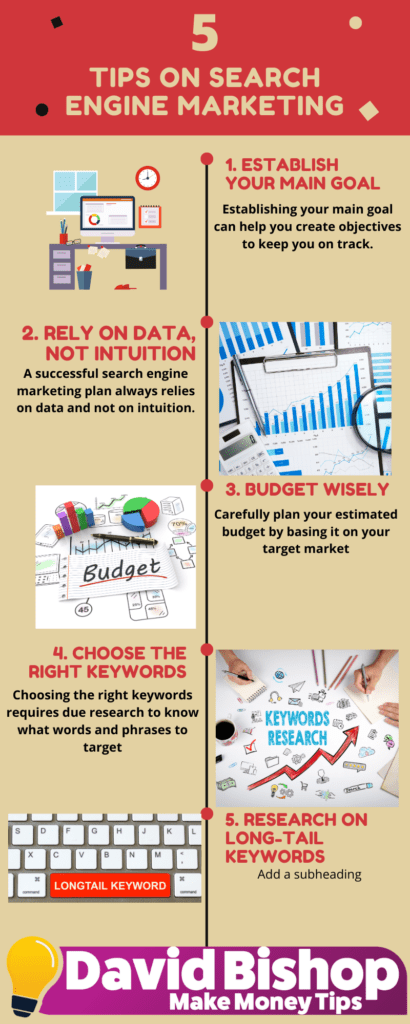Search Engine Marketing is a powerful and effective strategy to increase your website traffic and grow your business. In an increasingly competitive marketplace, it’s never been more important to advertise online. So, what is it about? And how does it work? Let’s first try to understand the essential things about search engine marketing.
What is Search Engine Marketing or SEM?
Search Engine Marketing is when you use paid advertising to show your products or services on search engine results pages or SERPs. When a user looks up a keyword related to your business, search engine marketing displays your website on the top of the result page before the organic results.
How does it work?
Search engine marketing works pretty straightforwardly, as shown below. But it is important to remember that creating and optimizing ads to beat your competition is a challenging part.
- The advertiser selects relevant keywords or phrases that will trigger when the ads will show up.
- They will decide how much they are willing to bid, which is based on per click.
- When a user searches for keywords or phrases, they will display the ads.
- They will position the ads depending on who bid the most and other factors.
- If the user clicks on the ad, the advertiser is charged for the click.
 What are the benefits of Search Engine Marketing?
What are the benefits of Search Engine Marketing?
Search engine marketing provides many benefits, but the ones below are the most significant advantages of it.
- Brand Exposure – When a user types in a query in search engines, it is the paid ads that they will see first. This placement is advantageous for businesses as it positions your brand front and center in the consumer’s eyes.
- Immediate website traffic – Since it can give your ads front page exposure, there’s a higher chance and regularity in driving traffic to your website.
- Full targeting capabilities – There are plenty of opportunities to optimize your search ads to target the right prospects. You can also retarget your prospects who visited your site but have converted yet.
- In-depth tracking and analytics – You’ll be able to monitor campaigns, track conversions, and view other detailed data analytics. These reports will help you know your prospects if you’re getting enough leads or check your ad spend.
So, now that you have some basic knowledge about Search Engine Marketing, we will be sharing with you our most recommended tips, so you get the most out of it. Let’s take a look!
1. Establish your main goal
Establishing your main goal can help you create objectives to keep you on track. It would be best if you were clear about what you would like to achieve from paid search advertising. Here are some things you should consider to develop a solid search engine marketing goal:
- Identify your target market
- Determine your customer’s needs
- Analyze your offer
- Check your budget
- Layout the time frame for each ad
- Design customer-centric ad campaigns
- Create compelling call-to-action
- Check your competitors
- Measure your ad campaign results
It is also important to bear in mind that establishing a goal is not a one-and-done deal. You will need to revisit your objectives and make changes when needed. Sometimes the one thing that sets you apart from your competition is how you fine-tune your plans to achieve your goal in search engine marketing.
Click here right now for our review, my personal help, and instant access to our free training videos where we'll show you exactly how we did it ourselves starting out as complete beginners without ANY prior knowledge or experience in marketing online whatsoever!
2. Rely on data, not intuition
A successful search engine marketing plan always relies on data and not on intuition. You may think that you know your customers like what will cause them to convert or click through. But your strategies may not work without basing them on data. The reoccurring testing, evaluation, and campaign tweaks will enable you to understand what specific strategy works best for your customers.
3. Budget wisely
Carefully plan your estimated budget by basing it on your target market and your return on investment or ROI. Expect that search engine marketing is a long-term strategy and a commitment. The challenge when it comes to budgeting is how long you can sustain it. You can treat search engine marketing as a marathon and not a sprint.
4. Choose the right keywords
Choosing the right keywords requires due research to know what words and phrases to target. Ensure that the words are being queried and are not impossible to rank. You can use a keyword search tool to help you with your research. We will use Jaaxy for our example:

For instance, your business or your niche is in the beauty industry. Enter the word “beauty products” in the search field on the Jaaxy keyword search tool. You will notice that the average search per month for those keywords is around 5K. You will also find that most results have a “Great” keyword quality indicator, and the SEO score is high. This means that they are good choices for keywords that could rank in the Google search engine.
Share or embed this infographic code provided below.
<div class="wp-block-image"><figure class="aligncenter"><a href="https://davidbishopmakemoneytips.com/search-engine-marketing/ "><img src="https://davidbishopmakemoneytips.com/wp-content/uploads/2021/01/5-Tips-On-Search-Engine-Marketing-410x1024.png" alt="5 Tips On Search Engine Marketing" class="wp-image-12930" title="5 Tips On Search Engine Marketing"/></a></figure></div>5. Research on long-tail keywords
Long-tail keywords are longer and more specific keywords that users are more likely to use when using voice search, smart speakers, and closer to the point of purchase. You can make use of the Google keyword planner to do your research. Search the top keywords in your industry and rank them based on their monthly search volume and cost per click. Check those with high volume and low prices and try to uncover opportunities for search engine marketing.
6. Utilize internal links
Make sure your content has an internal link to one of your other relevant posts. Besides keeping your readers within your website, it also establishes your authority and expertise on the topic. More importantly, it boosts your website’s SEO. It helps drive traffic to your other web pages and helps search engines to find pages on your website to rank them.
7. Improve landing page quality
By improving your landing page quality, you also improve your ad’s quality score. Your landing page should be fast-loading and mobile-optimized as well. It should be directly relevant to the ad and the searched keywords by the user. Also, it must be easy to navigate so that the customer can spot the product mentioned in the ad quickly. You should also include relevant information about your business.
8. Understand Ad rankings
Ad rankings differ depending on what platform you’re using. Although your customers decide what ad they want to click on, understanding ad rankings can help you strategize better to stand out from your competitors. Remember that it works like an auction, and the position of your ad changes whenever a user performs a search. Here’s how your ad will rank based on each platform:
- Google Adwords – Your ad ranks based on your maximum bid and your ad’s quality score.
- Bing Ads – The ad’s quality score is based on keyword relevance and click-through rate.
- Yahoo Gemini – Similar to Bing’s formula but differs in broad match identifiers.
 9. Optimize your ad copy
9. Optimize your ad copy
Another great way to help you generate more leads is to optimize your ad copy. For example, in Google, you have two 30-character headlines and one 80-character description line. Use these lines effectively to create high-quality ad copy. Here are some best practices you can do to improve your ad copy:
- Always include your most important message in the headlines
- Before adding a second headline, use extra characters first for call-to-actions or for highlighting existing offers
- Write ads that are multi-devices ready (desktop, tablet, or mobile)
- Include top keywords in the path fields
- Update your ad extensions
10. Maximize ad extensions
Ad extensions improve click-through rate or CTR, which also affects your ad rankings; therefore, it is just right to maximize it. It helps customers know what else they can expect when they click on your ad without additional costs. You can add the following types of ad extensions whenever applicable:
- Sitelinks – These links show other relevant landing pages.
- Seller ratings – This is an automated extension that adds your website’s ratings. You need to accumulate 150 reviews from Google trusted review sources with 3.5 stars and higher for the past 12 months.
- Call-Out – Displays important selling proposition.
- Call Extension – This is a phone number that shows text ads that allow mobile users to call your business.
- Location Extension – This displays your business address along with your phone number.
- App Extension – It adds a link to your app in Google Play Store or Apple store if you have one.
- Review extensions – Shows third-party reviews.
- Price extensions – This displays your products or services’ pricing information with a clickable header.
- Structured Snippets – Displays features and descriptions of a product or service.
- Message extensions – This enables your customer to send you a message directly.
- Affiliate Extension – This shows nearby stores that sell your products.
11. Know your competition
Always keep in mind that in any given market, there’s always competition. This is why it pays to know who your competitors are. You can do this by learning what they do well and finding out how you can do it better. Ensure that your search engine marketing plan sets itself apart from competitors. It is also a good habit to always look for ways to improve, such as using new tools and testing out which ones work more effectively than the others.
Search Engine Marketing may need thorough attention and management, but it is a great way to gain online exposure and grow a business. Hopefully, our tips will help you create effective search engine marketing strategies that will enable you to gain more leads and conversions. Now it is up to you to make your search engine marketing strategies successful.
If you want to learn more about Search Engine Marketing and how you can be effective, you can try our top recommendation. It offers 24/7 support, SEO tools, a free keyword search tool, one-on-one mentorship, and many more.
See the 4 steps to working online from home & earn residual income


 9. Optimize your ad copy
9. Optimize your ad copy
Thank you for this great overview of what needs to be considered when undertaking search engine marketing. It’s a lot to digest but I do have questions. You make no mention of what it might cost to advertise on Google so I’m hoping you can give me some sort of range. Is it possible to get the first search page of Google without paid advertising? Also, I had always been told that Bing and Yahoo were the same search engine. Has this changed? I look forward to hearing what you have to say about this!
Cynthia, it is a lot but you do not have to do all at once. You can start with a few and get a feel on what is working for you. And as you reach a comfortable level, you can then move on to another. Google advertising is a great way of ramping up your marketing efforts if you know what you are doing. My experience beginning was between $320 to $390 monthly. It is possible to get on the first page on Google without paid advertising if you choose the right keywords with low competition. The last time I checked, Bing and Yahoo are the same. I hope I answered all your questions.
Hello dear I really love the processes involved in search engine tips. The advertiser selects relevant keywords or phrases that will trigger when the ads will show up.
They will decide how much they are willing to bid which is based on per click.
When a user searches for the keywords or phrases the ads will be displayed.
The ads will be positioned depending on who bid the most and other factors.
If the user clicks on the ad, the advertiser is charged for the click. This tips has really made everything easy.
Is one of the fastest ways to build your brand and drive traffic to your website while working on your content and video marketing to get more exposure. If you have a good campaign going for your bucks, you can then scale it up if you need more traffic.